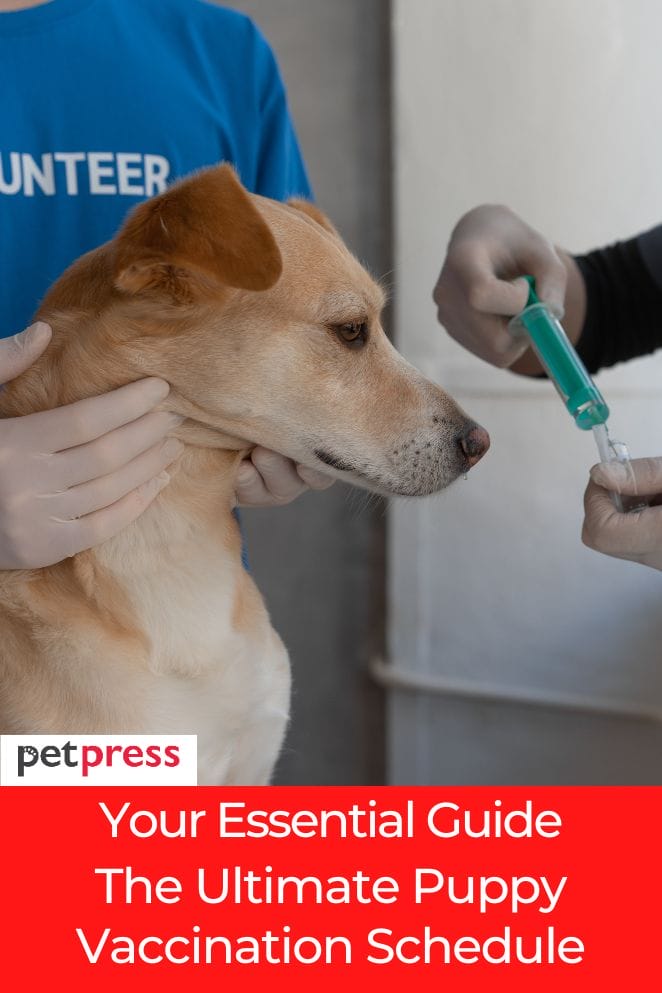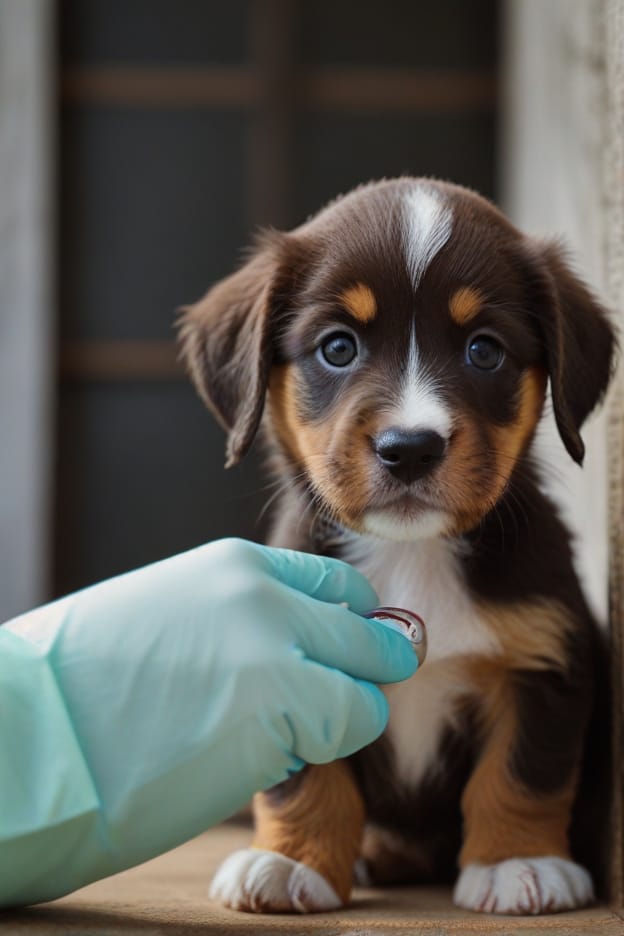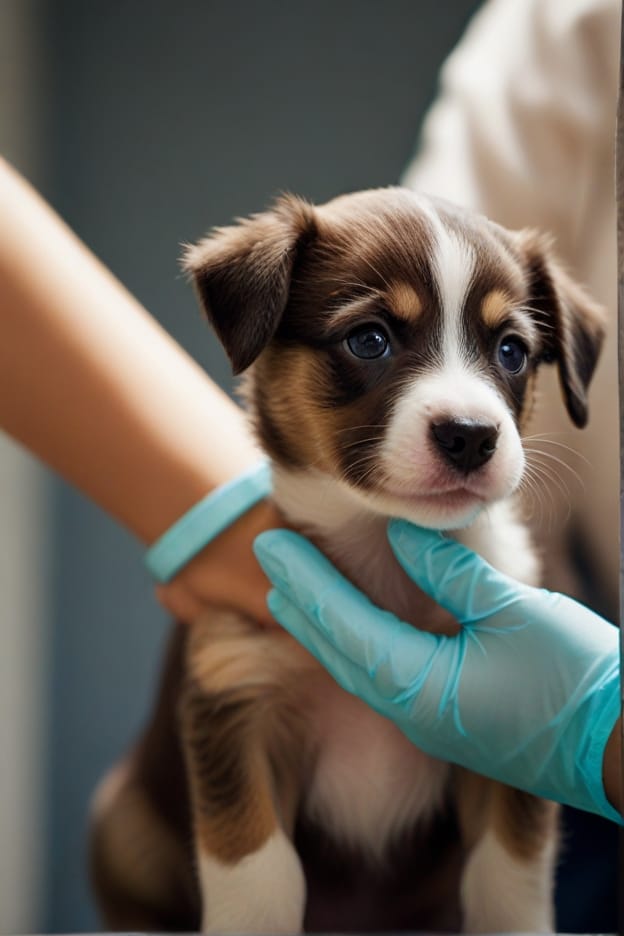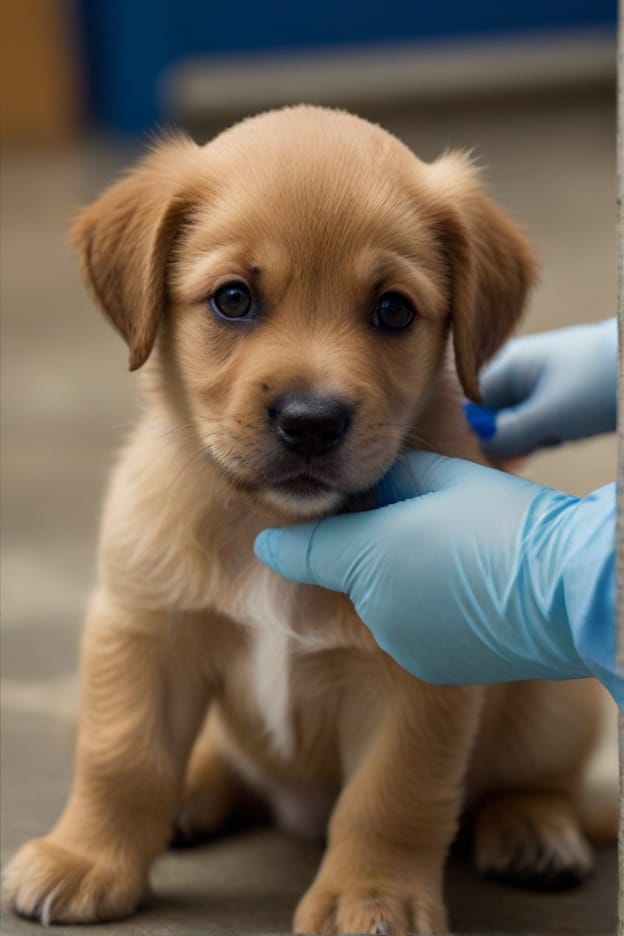
Welcoming a new puppy into your home is an exciting time.
However, it’s essential to ensure your furry friend stays healthy and protected.
One of the most crucial steps in puppy care is vaccination.
Vaccinations protect your puppy from various diseases, ensuring they live a long, happy life.
In this blog post, we’ll discuss the puppy vaccination schedule, non-core vaccinations, and additional information to help you make informed decisions about your puppy’s health.
What Are The Benefits of Vaccinating Puppies
Vaccinating puppies provides numerous benefits that contribute to their overall health and well-being.
Some of the key benefits include:
Disease prevention
Vaccines stimulate the immune system to recognize and combat specific pathogens, significantly reducing the risk of infections that can be debilitating or even fatal.
By preventing the spread of diseases, vaccinations help create a healthier and safer environment for all pets, especially in shared spaces like parks, grooming facilities, and boarding facilities.
Longevity and quality of life
Vaccinated pets are more likely to live longer, healthier lives by preventing diseases that can lead to chronic conditions or severe illness.
This contributes to the overall well-being of your pet, allowing them to enjoy a higher quality of life and age gracefully.
Cost-effective healthcare
Preventing diseases through vaccinations is often more cost-effective than treating illnesses after they occur.
Veterinary treatments for diseases like parvovirus or distemper can be expensive, and the emotional toll of watching your pet suffer from a preventable condition can be heartbreaking.
Vaccinations provide a cost-efficient way to protect your pet from these potentially devastating conditions.
Legal requirements
In many states, dog vaccinations are required by law.
Ensuring your pet is up-to-date on vaccinations can help you comply with these regulations and make it easier to access services and facilities when needed.
Protection for other pets and humans
Vaccinating your pet not only protects them but also helps prevent the spread of diseases to other animals and even humans.
This is especially important for pets that spend time with children, patients with weakened immune systems, or the elderly.
Boosting immunity
Vaccines work by stimulating the body’s immune system to recognize and fight a particular microorganism, such as a virus, bacteria, or other infectious organisms.
This helps your pet’s immune system develop a stronger response to future exposures to these diseases.

Core Vaccinations and Schedule
| Age of Puppy | Vaccinations Given |
Brief Description of Diseases
|
| 6-8 weeks | DAPP |
Protects against: Distemper, Adenovirus, Parvovirus, Parainfluenza
|
| 10-12 weeks | DHPP |
Protects against: Distemper, Hepatitis (Adenovirus), Parvovirus, Parainfluenza
|
| 12-16 weeks | Rabies |
Protects against: Rabies virus, a deadly viral infection affecting the central nervous system
|
Non-Core Vaccinations
While core vaccines are essential for all puppies, non-core vaccinations provide additional protection against specific diseases depending on your puppy’s lifestyle and risk factors.
Here’s a breakdown of some common non-core vaccines for puppies:
Leptospirosis
Leptospirosis is a bacterial disease that can infect dogs through contact with contaminated water or soil.
This disease tends to be more common in areas with high wildlife populations, such as raccoons and rodents.
It’s vital in regions where your puppy may come into contact with these animals or environments, like rural areas or places with heavy rainfall.
Bordetella (Kennel Cough)
Bordetella, also known as Kennel Cough, is a highly contagious respiratory illness.
It spreads rapidly in places where dogs gather, like boarding facilities, dog parks, or even during casual interactions with other dogs.
If your puppy will be around other dogs frequently, such as at daycare or grooming facilities, this vaccine might be recommended.
Lyme disease
Lyme Disease is transmitted by ticks and can lead to various symptoms, including lameness, fever, and kidney problems.
The vaccine becomes crucial if you live in an area with a high tick population, as these parasites are the primary carriers of the disease.
Regular walks or outdoor activities increase the risk of tick exposure, making this vaccine important for puppies in such environments.
Canine influenza
Canine Influenza is a contagious respiratory virus that can cause flu-like symptoms in dogs.
While not as widespread as some other diseases, the vaccine may be recommended for puppies who will be in close contact with other dogs frequently, such as those attending doggy daycare or visiting groomers regularly.
Rattlesnake toxoid (optional):
Rattlesnake Toxoid is an optional vaccine designed for puppies in regions with a high population of rattlesnakes.
It helps protect against the venom of rattlesnake bites, which can be life-threatening.
If you live in an area where encounters with rattlesnakes are possible, such as rural or wilderness areas, this vaccine may be worth considering, especially if you enjoy outdoor activities with your puppy.

Determining the Need for Non-Core Vaccines
Determining whether your puppy needs non-core vaccines involves considering various factors that influence their risk of exposure to specific diseases.
By evaluating aspects such as lifestyle, location, and age, you can make informed decisions about which additional vaccinations are necessary for your puppy’s well-being.
Lifestyle
Take into account your puppy’s daily activities and interactions.
Does your puppy frequently socialize with other dogs at places like doggy daycare, boarding facilities, or dog parks?
Dogs that have regular contact with unfamiliar animals in these settings are at higher risk of contracting contagious diseases like Bordetella (Kennel Cough) and Canine Influenza.
Location
Consider the prevalence of specific diseases in your area.
Certain regions may have a higher incidence of particular diseases due to environmental factors or wildlife populations.
For example, areas with abundant wildlife, such as raccoons and rodents, may have an increased risk of Leptospirosis transmission through contaminated water sources.
Similarly, regions with dense tick populations could pose a greater threat of Lyme disease.
Age
Some non-core vaccines have age restrictions, meaning they are only suitable for puppies above a certain age.
For instance, the Lyme disease vaccine typically has a minimum age requirement before administration.
It’s essential to adhere to these guidelines to ensure the vaccine’s effectiveness and your puppy’s safety.
Consulting Your Veterinarian
It’s crucial to discuss your puppy’s individual needs with your veterinarian.
They will consider your puppy’s lifestyle, risk factors, and potential health concerns to create a personalized vaccination plan.
They can also advise on the frequency of booster shots for non-core vaccines, as some may require annual boosters.
Remember: Non-core vaccinations offer valuable protection, but they aren’t a substitute for core vaccines.
Always prioritize core vaccinations to keep your puppy safe from the most serious diseases.

Vaccination Side Effects
Vaccinations are a vital part of keeping your puppy healthy, but they can sometimes cause mild side effects.
Here’s what you need to know about what’s normal and when to seek veterinary attention.
Common side effects
- Mild discomfort: You might notice some tenderness or swelling at the injection site. This is because your puppy’s immune system is working hard to respond to the vaccine.
- Lethargy: Your puppy might be less active than usual for a day or two after vaccination.
- Loss of appetite: Some puppies might eat less after getting their shots.
- Low-grade fever: A slight temperature increase is a normal response to the vaccine.
These side effects typically appear within a day or two of vaccination and should subside on their own within 24-48 hours.
When to worry
Severe pain or swelling: If the injection site becomes very red, swollen, or painful to the touch, consult your veterinarian.
- Persistent vomiting or diarrhea: These symptoms could indicate a more serious reaction.
- Difficulty breathing: This is a sign of a severe allergic reaction and requires immediate veterinary attention.
- Hives: Raised, itchy bumps on the skin can be a sign of an allergic reaction.
- Facial swelling: Puffiness around the eyes, muzzle, or face can indicate a serious reaction.
- Lethargy lasting more than a day or two: If your puppy’s energy level doesn’t improve within a couple of days, contact your veterinarian.
Tips for minimizing side effects
- Discuss with your veterinarian: Let them know if your puppy has any allergies or has experienced reactions to previous vaccinations.
- Pain relief: Your veterinarian might recommend a pain reliever for your puppy after vaccination.
- Comfort: Provide a quiet, comfortable space for your puppy to rest after vaccination.
Cost of Vaccinations
Vaccination expenses can fluctuate depending on where you live and the veterinary clinic you choose.
Typically, a complete set of puppy vaccinations can cost between $100 and $200.
However, these prices may differ based on factors such as the number of vaccines needed and any extra services offered by the clinic.
The cost of vaccinations varies from place to place, so it’s a good idea to inquire about specific prices when scheduling your puppy’s appointments.
Additionally, some clinics may offer package deals or discounts for multiple vaccinations, which can help reduce the overall cost.

When Can Puppies Go Outside
Before your puppy can safely explore the great outdoors, it’s crucial to wait until they have full protection from vaccinations.
This usually means waiting until they’ve had their initial round of vaccinations, typically between 8 and 12 weeks of age.
This waiting period ensures that your puppy is shielded from potential diseases they might encounter outside.
It’s important to prioritize your puppy’s health and safety by adhering to this waiting period.
While it may be tempting to take them out for walks or adventures earlier, waiting until they’re fully vaccinated significantly reduces their risk of contracting harmful illnesses.
Conclusion
Puppy vaccinations are a crucial part of your puppy’s healthcare routine.
By following the recommended vaccination schedule and discussing non-core vaccinations with your veterinarian, you can help ensure your puppy stays healthy and protected.
Remember to monitor your puppy for any side effects and wait until they’re fully vaccinated before taking them outside.
FAQs
Puppies typically receive their first set of vaccinations between 8 and 12 weeks of age, with booster shots given every 3 to 4 weeks until they’re around 16 weeks old. After that, annual vaccinations are recommended to maintain protection.
No, non-core vaccinations are not mandatory for all puppies but may be recommended based on your puppy’s lifestyle and potential exposure to certain diseases.
Mild side effects, such as temporary pain or swelling at the injection site, are common. However, severe reactions are rare and may include difficulty breathing excessive lethargy, or loss of appetite. If you notice any of these symptoms, contact your veterinarian immediately.
The cost of puppy vaccinations can vary depending on your location and the clinic you visit. On average, the cost of a full set of puppy vaccinations ranges from $100 to $200.
It’s essential to wait for full vaccination protection before taking your puppy outside. This typically means waiting until your puppy has received their first round of vaccinations, which is usually between 8 and 12 weeks of age.
- Does Cat Litter Melt Ice? The Complete Guide to Winter Safety - January 30, 2026
- Happy Tail Dogs: Understanding This Common Canine Condition - January 29, 2026
- How Cold Can Outdoor Cats Handle? Feline Winter Safety - January 27, 2026


GIPHY App Key not set. Please check settings